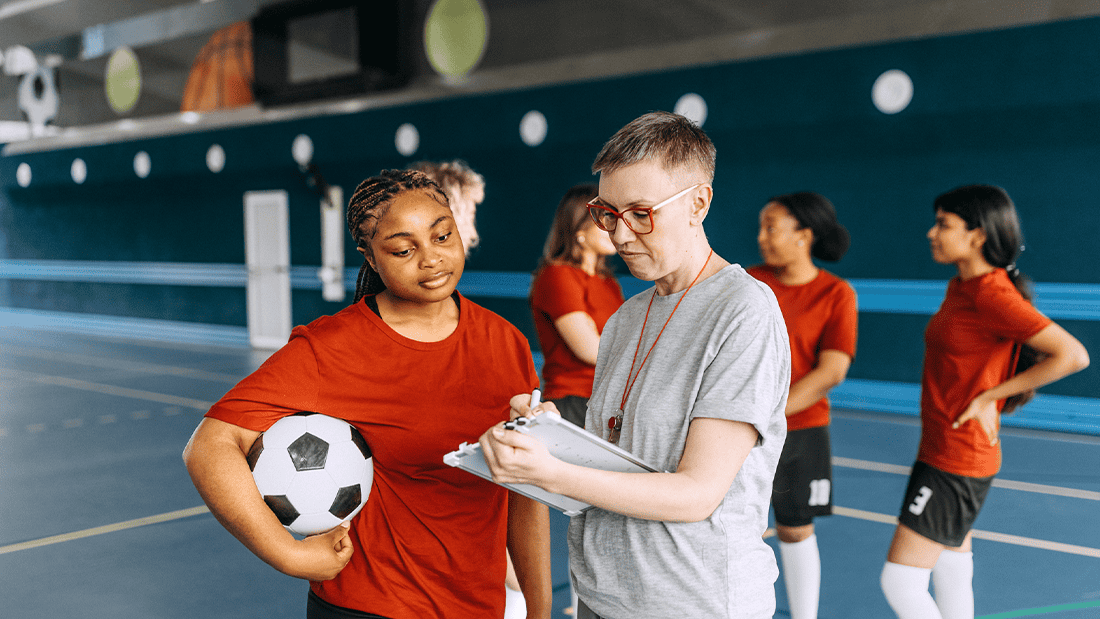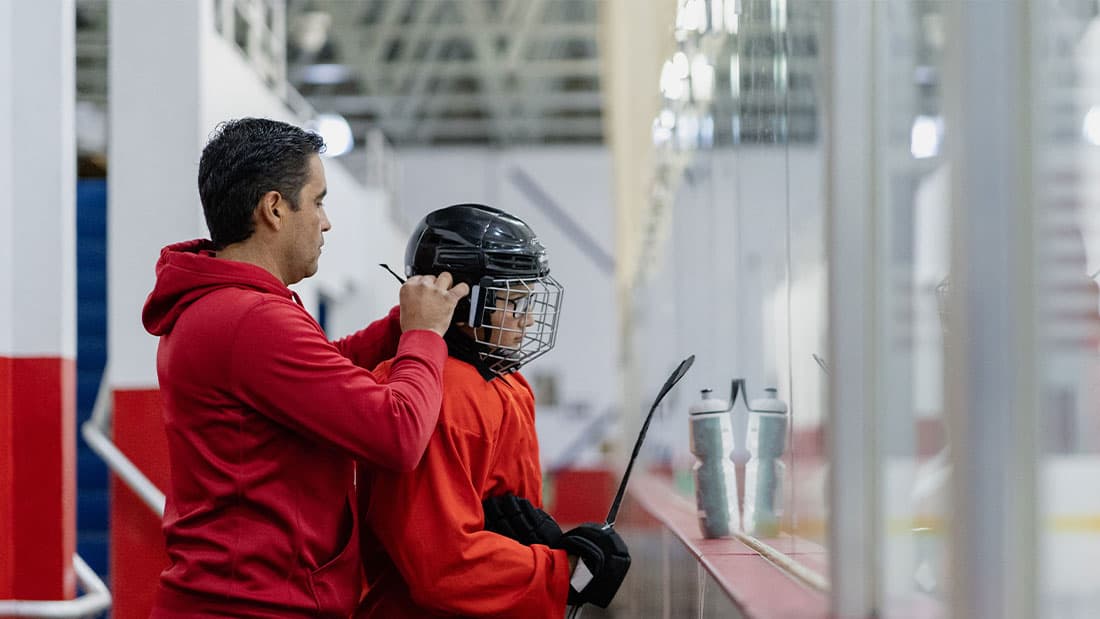As coaches, we should always be searching for ways to help our athletes.
Whether it be offering some much-needed advice, helping them break down game film or providing support when they need it most, great coaches are there for their players. Great coaches have the ability to help athletes discover their true potential and elevate themselves into something greater. Their advice and actions can change lives.
However, some coaches have trouble following their own advice. I’ve noticed this trend in strength and conditioning, and it seems to occur most often with young coaches.
It’s important to appreciate some of the same principles that go into being a great athlete are the same as being a great coach. They are just disguised a little differently!
I don’t purport to know everything about coaching (far from it), but I believe these three tidbits of wisdom can be tremendously useful for coaches who are aspiring to or just starting out in a career in strength and conditioning.
1. Generalize Before You Specialize
For athletes, there’s immense benefit to playing multiple sports early on and putting off specialization until their mid or late-teens.
And in how we train athletes, we want to develop a strong foundation of quality movement before sharpening the specific qualities most distinct to their sport.
Yet I see too many coaches rushing to specialize before they generalize.
They graduate college, get a certification and rush into announcing themselves as purely a “baseball guy,” a “basketball guy,” etc.
When you start out in the training industry, I believe it’s highly beneficial to train everyone!
Moms, dads, youth athletes, people looking to slim down or bulk up or beat back pain—everyone. Announcing yourself as a specialist too early can limit the scope of your learning and the opportunities that you encounter. Training a breadth of clients gives you experience and insights you simply don’t discover when you limit yourself to a narrow scope of the population.
Being a specialist requires just that—specialty. It will take you a long time to learn enough about that special population you are going after for people to really call you a “specialist.” Pushing this too early can hurt your long-term development as a coach, just like specializing too early can hurt the development of an athlete.
When you start as a generalist, sometimes the “specialty” will find you.
You will get an unexpected opportunity. If your plan was to be a football strength coach and someone comes to you to train their hockey team, then run with that opportunity. If you do a good job, you get another team. Then maybe you get some college guys. And if you crush that, maybe an NHL agent calls you. All of the sudden, you’re training high-level hockey players when just a couple years earlier, you thought you were going to be a “football guy.” Success is when hard work meets opportunity. You can always control the hard work, but don’t limit your opportunities when you’re just starting out in strength and conditioning.
2. Be Patient
As coaches, it’s not unusual for an athlete or their parent to get impatient about their progress.
Strength isn’t coming on fast enough. Their 40-yard dash time isn’t dropping quickly enough. They need to gain more weight.
Everyone wants eye-popping results overnight, but we know that’s not how it works. As coaches, we like to tell our athletes to have patience and trust the process. But let’s flip the switch.
How many young strength coaches are skipping the first 10 steps in their career?
I’m seeing coaches with six months of experience lament that they should have more followers on Instagram or that they should be training professional athletes.
Athletes don’t step on a field and get put in the Hall of Fame the next day, and you certainly won’t be put on the coaching Mount Rushmore before the age of 25.
Many coaches get impatient with the process and quit before they get their big break.
I like to tell young strength coaches: prepare for the opportunity you don’t know about yet.
Gather information, perfect your coaching, keep training yourself, and one day someone will notice. Respect the industry, respect the amount of work it takes to be the best, and don’t take shortcuts.
Be patient.
3. Ask for Help
Unlike the previous two points, this one is a little more black and white.
We desperately want our athletes to feel like they can ask us for help when they need it. Yet many coaches walk around like they already know everything.
You cannot be afraid to ask for help. No one can teach you like the people who were one day in your shoes and who are now where you aspire to be.
As renowned strength coach Mike Boyle so eloquently puts it, “steal smart people’s stuff.” Talk to and learn from those whose work you admire.
Seeking out help signifies that you’re open to change, which is an essential trait to growth in this field.
Talking to the right coaches not only helps you get better, but it gets your name out in the industry and allows you to network in a respectful way. Everyone who is at the top has asked questions, received help and drawn inspiration from others, and the reason they’re still there is because they continue to do so today.
The sooner you’re willing to ask for help, the better off you’ll be.
Photo Credit: GrapeImages/iStock
READ MORE:
RECOMMENDED FOR YOU
MOST POPULAR
As coaches, we should always be searching for ways to help our athletes.
Whether it be offering some much-needed advice, helping them break down game film or providing support when they need it most, great coaches are there for their players. Great coaches have the ability to help athletes discover their true potential and elevate themselves into something greater. Their advice and actions can change lives.
However, some coaches have trouble following their own advice. I’ve noticed this trend in strength and conditioning, and it seems to occur most often with young coaches.
It’s important to appreciate some of the same principles that go into being a great athlete are the same as being a great coach. They are just disguised a little differently!
I don’t purport to know everything about coaching (far from it), but I believe these three tidbits of wisdom can be tremendously useful for coaches who are aspiring to or just starting out in a career in strength and conditioning.
1. Generalize Before You Specialize
For athletes, there’s immense benefit to playing multiple sports early on and putting off specialization until their mid or late-teens.
And in how we train athletes, we want to develop a strong foundation of quality movement before sharpening the specific qualities most distinct to their sport.
Yet I see too many coaches rushing to specialize before they generalize.
They graduate college, get a certification and rush into announcing themselves as purely a “baseball guy,” a “basketball guy,” etc.
When you start out in the training industry, I believe it’s highly beneficial to train everyone!
Moms, dads, youth athletes, people looking to slim down or bulk up or beat back pain—everyone. Announcing yourself as a specialist too early can limit the scope of your learning and the opportunities that you encounter. Training a breadth of clients gives you experience and insights you simply don’t discover when you limit yourself to a narrow scope of the population.
Being a specialist requires just that—specialty. It will take you a long time to learn enough about that special population you are going after for people to really call you a “specialist.” Pushing this too early can hurt your long-term development as a coach, just like specializing too early can hurt the development of an athlete.
When you start as a generalist, sometimes the “specialty” will find you.
You will get an unexpected opportunity. If your plan was to be a football strength coach and someone comes to you to train their hockey team, then run with that opportunity. If you do a good job, you get another team. Then maybe you get some college guys. And if you crush that, maybe an NHL agent calls you. All of the sudden, you’re training high-level hockey players when just a couple years earlier, you thought you were going to be a “football guy.” Success is when hard work meets opportunity. You can always control the hard work, but don’t limit your opportunities when you’re just starting out in strength and conditioning.
2. Be Patient
As coaches, it’s not unusual for an athlete or their parent to get impatient about their progress.
Strength isn’t coming on fast enough. Their 40-yard dash time isn’t dropping quickly enough. They need to gain more weight.
Everyone wants eye-popping results overnight, but we know that’s not how it works. As coaches, we like to tell our athletes to have patience and trust the process. But let’s flip the switch.
How many young strength coaches are skipping the first 10 steps in their career?
I’m seeing coaches with six months of experience lament that they should have more followers on Instagram or that they should be training professional athletes.
Athletes don’t step on a field and get put in the Hall of Fame the next day, and you certainly won’t be put on the coaching Mount Rushmore before the age of 25.
Many coaches get impatient with the process and quit before they get their big break.
I like to tell young strength coaches: prepare for the opportunity you don’t know about yet.
Gather information, perfect your coaching, keep training yourself, and one day someone will notice. Respect the industry, respect the amount of work it takes to be the best, and don’t take shortcuts.
Be patient.
3. Ask for Help
Unlike the previous two points, this one is a little more black and white.
We desperately want our athletes to feel like they can ask us for help when they need it. Yet many coaches walk around like they already know everything.
You cannot be afraid to ask for help. No one can teach you like the people who were one day in your shoes and who are now where you aspire to be.
As renowned strength coach Mike Boyle so eloquently puts it, “steal smart people’s stuff.” Talk to and learn from those whose work you admire.
Seeking out help signifies that you’re open to change, which is an essential trait to growth in this field.
Talking to the right coaches not only helps you get better, but it gets your name out in the industry and allows you to network in a respectful way. Everyone who is at the top has asked questions, received help and drawn inspiration from others, and the reason they’re still there is because they continue to do so today.
The sooner you’re willing to ask for help, the better off you’ll be.
Photo Credit: GrapeImages/iStock
READ MORE:











